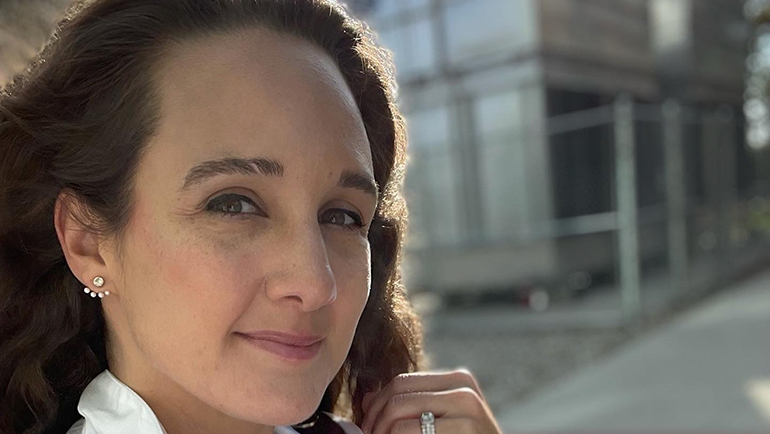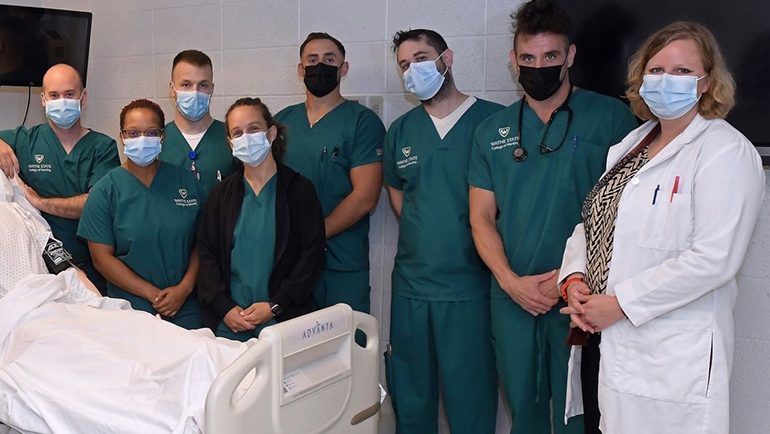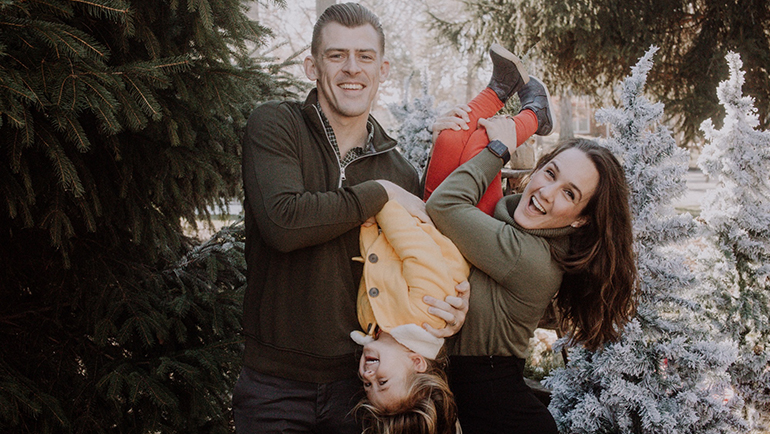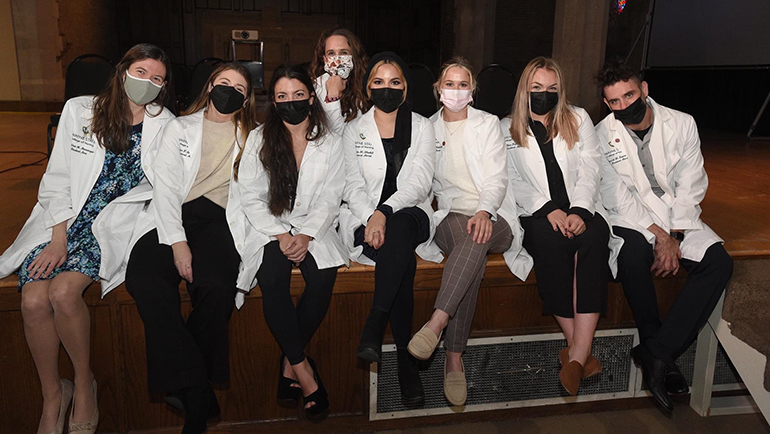DETROIT – Basic combat training is not easy. Negotiating obstacle courses and rappelling from 40-foot towers may be the toughest things a soldier will accomplish in their lifetime.
For Casey Guevara, basic training – aka boot camp – was hellish. It was nine weeks of physical, mental and emotional stressors led by intimidating drill sergeants famous for yelling, “Drop and give me 20!”
“Basic training is hard,” she said. “It is the most demanding and taxing thing I have ever done in my life.”

Guevara thought she had met her match in the U.S. Army. But that was before she enrolled in the Wayne State School of Nursing’s BSN for Veterans (VBSN) program. She says the accelerated program is far more grueling than boot camp at Fort Jackson in Columbia, South Carolina.
“People don’t want to go back to traditional nursing school, let alone the accelerated program,” she said with a laugh. “No, I can’t go back to nursing school.”
VBSN students are admitted once a year into an 18-month cohort and do their clinical rotations at the John D. Dingell VA Medical Center in Detroit. Six VBSN students — including Guevara — will graduate on Dec. 17 during a ceremony at the Wayne State Fieldhouse. Guevara was also selected by school officials to give the convocation speech at the College of Nursing Celebration of Graduates.
Guevara says one of the most rewarding aspects of her nursing school experience was getting to work with fellow military veterans in the VA hospital.
“It was great,” she said. “When we would come in and say, ‘Hi, I’m a student nurse,’ they would be like, ‘Oh, a student nurse.’ But then you’d say, ‘And I was in the Army.’ That changed their demeanor completely. ‘Oh, you’re family!’ They would light up and start telling us things because there is that brotherly love that instantly connected us because we all were in the service. It was awesome.”
It wasn’t long before faculty members began to take notice of Guevara’s compassionate, empathetic and clear caring for her patients.
“She has all of the traits you would expect to see in a good nurse,” said VBSN Assistant Professor Julia Farner, DNP, RN, FNP-BC, HHP. “However, as she progressed through the program, I saw her starting to make connections about how systems and policy and politics impact nursing and care at the bedside. I saw her take that knowledge and voluntarily work toward making changes.”

Farner praises her student for the work she has done with the nursing school’s Strategic Planning Committee, which is the backbone of how Wayne State educates students and impacts the community.
“She did all of this with humility and humor, which she brought to clinical days with her VBSN cohort,” Farner said. “It was truly a joy to have the opportunity to teach and to learn from Casey each semester of her nursing program.”
Now, as graduation draws near, Guevara says she’s excited for the opportunity to address her fellow undergraduates.
“I know that, typically, the student’s speech will talk about how they did it,” she said. “But the journey to get here in the first place – before we even entered nursing school – there’s a tremendous number of life-changing events for people.”
And Guevara is no exception.
The Tulsa, Oklahoma, native has overcome many life challenges on her journey to Wayne State University. She dropped out of college. Joined the military. Nearly died. Got married and had a baby. She even lost three grandparents (Tom, Stella and Bud) who died during the COVID-19 pandemic.
Now, she’s ready to receive her bachelor’s.
Following high school, Guevara attended the University of Central Oklahoma, where she entered a pre-med program. However, that initial college experience did not end well.
“I walked away from there with a 0.6 GPA,” said Guevara, who has three younger siblings. “I was not ready, but everybody back then told you that you had to go to college. I lived a different childhood. My dad didn’t finish high school, and my mom finished high school but then the day after, was on her own. So, I didn’t have anyone. I realized there was no money to go to college after that 0.6 GPA, so I had to go find it.”

Filled with determination to succeed, Guevara joined the Oklahoma National Guard, where she spent eight years, followed by another 12 months in the Texas National Guard.
When asked why she joined the National Guard, Guevara, who eventually rose to sergeant, said, “Patriotism wasn’t my first reason. It was because I needed money to go to school.”
But it was in Oklahoma, six years ago, when a harrowing experience nearly killed her. While awaiting deployment to the Middle East with the 777th Aviation Support Battalion, Guevara was rushed to the hospital with excruciating abdominal pain.
“The one time my unit was actually being deployed to Kuwait, I ended up having to get my colon take out, because it tried to kill me,” said Guevara, who was 26 at the time.
Diagnosed with colitis in 2012, Guevara had been living with the chronic digestive disease since she was a child, was unaware of the seriousness of her condition.
“I didn’t know what normal was. I never screened for it,” she said. “It wasn’t until I was in the Army that I was diagnosed, and they told me it wasn’t new.”
For the next few weeks, she couldn’t eat. Within five months, the colitis in her sigmoid colon had developed into pancolitis – inflammation that had spread throughout her colon.
“The damage was pretty permanent at that point,” she said. “We spent years trying to do the secondary prevention, which led to the tertiary prevention, and it was just the perfect storm of things that happened with the colon. I had a mega colon.”

Then, in the summer of 2016, a gastroenterologist gave her the grim news.
“He told me I had a month left to live,” Guevara said. “Here I was trying to get my associate degree and trying to go on deployment, and then my colon wiped it all out.”
Luckily, what did not kill Guevara made her stronger, and actually helped her map out a future in nursing when she met a wound, ostomy and continence (WOC) nurse.
“She was somebody that I trusted in the light of all of this darkness,” Guevara said. “She would do the teach-back method with me and my ostomy. She said, ‘I need you to teach this back to me.’ And I would. She would say, ‘I love how you are saying that. How you’re relating things. You’re speaking like a nurse.’ I was giggling. She came back the next day and was like, ‘Seriously, you need to think about it.’ My surgeon then came in and said, ‘You said you were pre-med; have you thought about nursing? You would be the best nurse.’
“While I was laying in the hospital bed with nothing to do, I was like, ‘Wait, let’s really think about this.’ Before I left the hospital, I was ready to try it, and it was my WOC nurse and surgeon who helped me.”
Soon after her discharge from the Army, Guevara and her husband, James, and their daughter, Olivia, moved from Dallas to Detroit, where his parents have a home on Grosse Ile.
“We moved in with my in-laws in January 2020 and waited to find a house as the pandemic hit,” she said.
It was during the COVID-19 lockdown that Guevara became ultra-motivated to finish her degree.

“Living in that house with three people with advanced degrees, they were like, ‘Here are the colleges that seem to fit you very well,’” she said. “While I was looking around, I kept noticing Wayne State, but I didn’t notice the VBSN program at first. Then someone said, ‘Have you seen this nursing program at Wayne State?’”
Guevara admitted that there’s nothing easy about the VBSN program. In fact, if it wasn’t for the support of her husband – who has a doctorate in computer science – getting to this point in her career would have been much more difficult.
“After the whole colon thing, he stood by my side, and I was like, ‘I’m gonna marry that guy,’” Guevara said.
The couple met in 2010 and married in 2018.
“He is such a huge part of my success,” she said. “I don’t think I could be where I am without him. I even get teary eyed just thinking about it. I owe a lot to him.”
Eventually, Guevara would like to work in labor and delivery. But in February, she will begin her next chapter as an emergency room nurse at Corewell Health Beaumont Grosse Pointe Hospital.
Like boot camp, the accelerated nursing program wasn’t easy. But Farner believes both experiences will make Guevara a better nurse.
“I have no doubt she will be a driving force for change in the field of nursing, and I am excited for her,” Farner said. “She’s a powerful advocate for her patients, for other students and for herself, and I think that is wildly admirable.”
